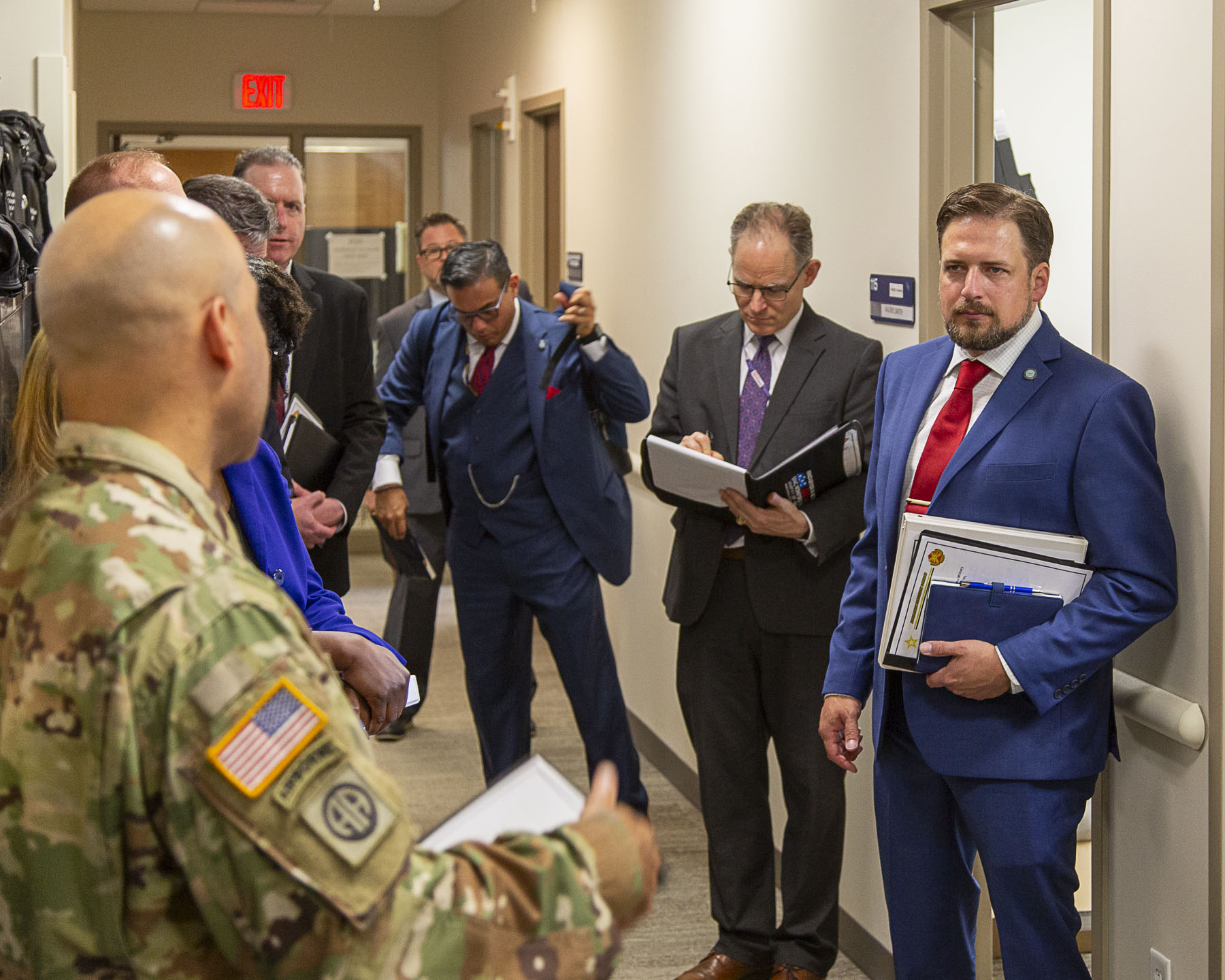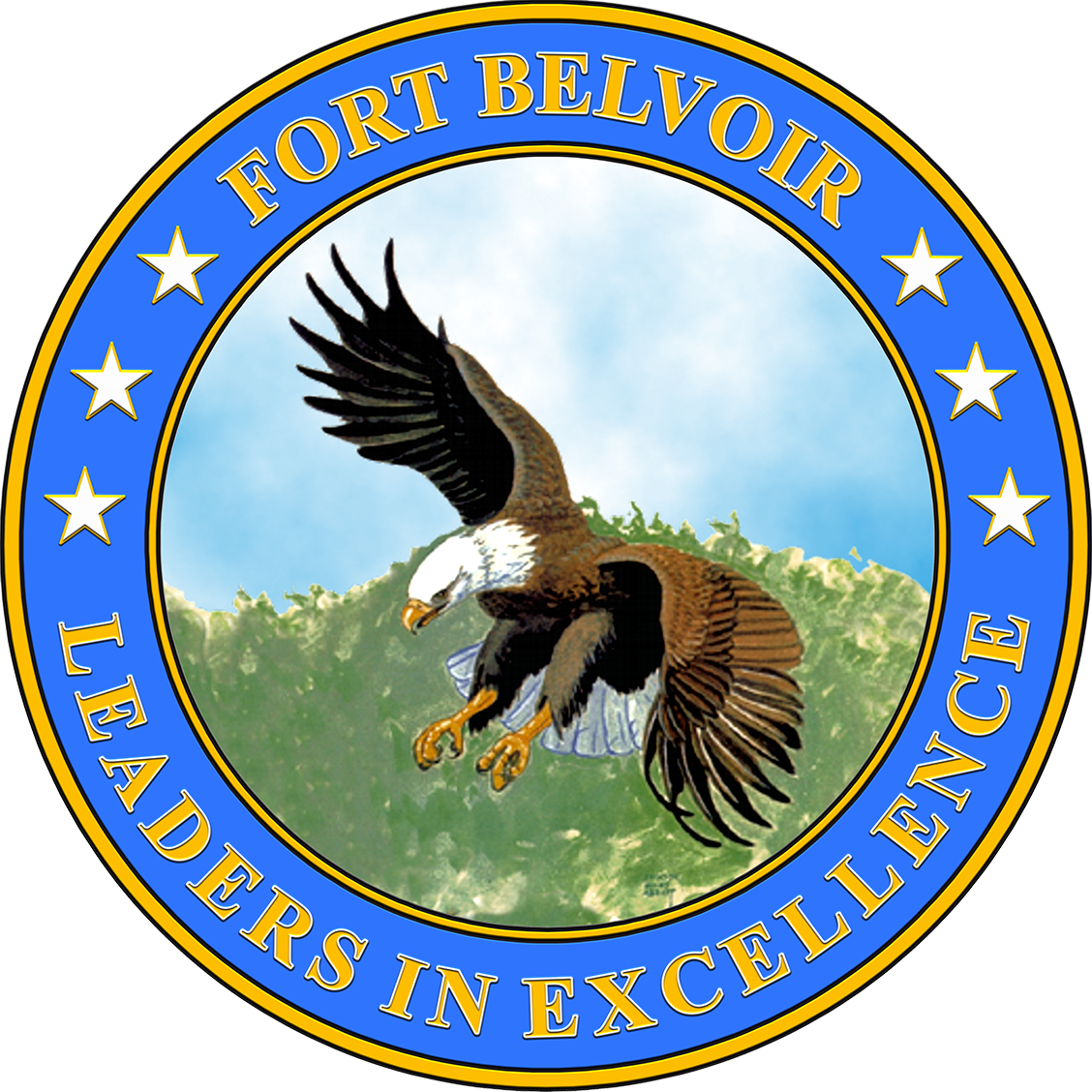
Col. David Stewart, Fort Belvoir Garrison commander, left, briefs Mr. Stephen Simmons, Deputy Assistant Secretary of Defense for Military Community and Family Policy (MC&FP), right, for his first foray to a military installation. He capitalized on the opportunity to speak with team members at Army Community Services and Child and Youth Services to better understand how to improve efficiencies and consolidate data.
Secretary Simmons Visits Fort Belvoir, probing Family Policy and Quality of Life
Mr. Stephen B. Simmons, Deputy Assistant Secretary of Defense for Military Community and Family Policy (DASD(MC&FP)) made his first installation visit on June 9, just south of the Pentagon to Fort Belvoir, to learn about Family life, and explore ways to improve the Quality of Life for service members and Families worldwide.
Col. David Stewart, Fort Belvoir Garrison commander, escorted the secretary to meet with key personnel who support Family life on the installation. After a brief overview at Garrison Headquarters, the tour proceeded to Army Community Services, where so many Family services are provided.
The first stop was a visit to the Army’s first-ever food bank, established by Fort Belvoir in May 2020, to respond to continuing issues of food insecurity among military families in the National Capital Region, one of the highest cost-of-living regions in the nation. In meeting with the ACS team, Simmons raised concerns about reducing the stigma associated with asking for help.
Col. Stewart suggested the first best step is education and promotion of available services.
“We have to make sure they understand all the different services and support mechanisms that are here to assist, but once you get them in the door, that's half the battle,” Stewart said. “You must have leader involvement to make sure they are carrying that message throughout their formations and letting people know that's okay.”
Stewart described the garrison team as being proactive in promoting well-being, health, and safety, emphasizing the challenge of delivering world-class service to amid staff shortages.
Tammy Braddye, Fort Belvoir Army Community Services (ACS) director, said that the popularity of the food bank, with about 250 people visiting each month, prompted them to embed the supplemental Women’s Infants and Children (WIC), the Department of Agriculture’s supplemental nutrition program at ACS each Wednesday.
Simmons expressed interest in the efficiency of integrating WIC services on-post, eliminating the need for families to travel off-base, and considered it a potential model for other installations.
Braddye explained that families only need to sign in to access the food bank. However, after a third visit, continued access requires the service member to enroll in ACS financial management and savings classes to address underlying issues.
Simmons also engaged with the teams that drive Family Advocacy, Military and Family Life Counseling, and the Exceptional Family Member Program (EFMP), to see if auto-enrollment would avoid that difficult hurdle in asking for assistance.
Command Sgt. Maj. Brandon Creel, Garrison CSM, agreed that Mr. Simmons had identified “the number one thing” impeding assistance, which is enrolling the family member into EFMP.
“They avoid it, and they will specifically not enroll their families and seek care on their own because of that career impact,” Creel said.
Simmons said he knew a family that needed EFMP assistance, and put off enrollment for that reason, but said after delaying assistance, discovered no change to his career.
“That’s why he’s still doing deployments … his career is not suffering at all,” said Simmons.
While visiting the JoAnn Blanks Child Development Center (CDC), Marie Grayson-George, Chief, Fort Belvoir Child and Youth Services, told Simmons the greatest challenge, even at 86 percent capacity at the three available CDC’s, remains infant care, since any caregiver can only care for 4 infants.
“We’re trying to get more infant spaces, which is the hardest position to fill; it’s a lot of work for one person,” said Greyson-George. She added that pay scales for their care givers are not competitive with the broader market outside the gates.
Simmons noted the vital role that quality care in CDCs can play years later, when those children become recruitable adults.
“Families grew up in CDCs and 20 years from now, are we going to take care of their children? Are they going to have a positive outlook on the military?” Simmons said, noting the retention fight begins with the children and their memories.
Later, at the Garrison’s All Hands meeting, Col. Stewart praised the MWR team for its engagement with Secretary Simmons.
“I want to showcase all the great work that the MWR team does in support of families and service members,” Stewart said. “They were happy with the discussions and impressed with the professionalism and great effort of our MWR and ACS teams. He was able to put a face on success for Fort Belvoir and the Army as he’s indoctrinated into his new position.”
Paul Lara, Fort Belvoir Public Affairs





